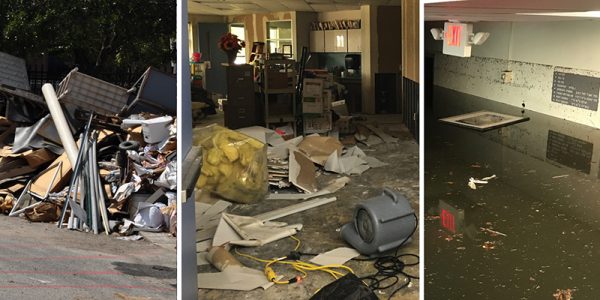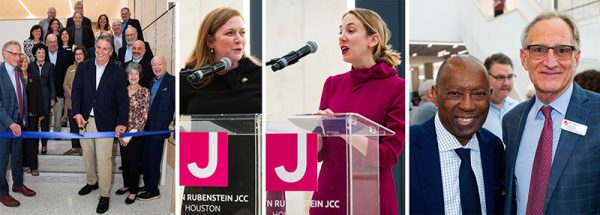By Doron Krakow
Courageous Community | Ometz Kehilati | אומץ קהילתי
They were calling for Saturday, February 25, to be a National Day of Hate. Threats leveled by so-called white supremacist and neo-Nazi groups intent on upending the Jewish community’s celebration of Shabbat. It didn’t amount to much. But our collective consciousness at the prospect had led to thoughtful preparation on the part of Jewish community leaders in every corner of the continent. Beyond the Jewish community, faith and political leaders of every stripe and countless others spoke out in solidarity and in defiance of antisemitism and hate.
The topic was very much on the minds of leaders of the Houston Jewish community early this week during my visit to celebrate the dedication of a major expansion and renovation of the Evelyn Rubenstein Jewish Community Center. I was joined by David Wax, chair of the board of JCC Association of North America, and Jennifer Mamlet, executive vice president of JCC Association. In conversations with staff and lay leaders at all levels, topics were wide-ranging, but over and over, they returned to antisemitism, a concern in recent years in Houston as well.
That the day of hate hadn’t materialized in any consequential way was a source of relief and satisfaction. But the question remains: How can we best contend with a rising tide of hatred of Jews and hatred of Israel?
Sunday’s extraordinary celebration and ribbon cutting at the new JCC had been a long time in coming. The JCC has been an anchor of the Houston Jewish community for decades and plans for its renovation were well underway when I joined JCC Association in 2017. In August of that year, however, disaster struck. Hurricane Harvey devastated parts of Houston and the JCC found itself under more than 10 feet of water. Portions of the campus were damaged beyond repair, and many of the JCC’s staff and lay leaders faced similar circumstances at home.

In the depths of the crisis, the needs of the community took precedence, and with support from friends and partners near and far, the JCC rose to ensure that those in greatest need were provided a helping hand in the form of childcare, critical supplies and equipment, counsel, and every manner of support. In the face of destruction at its primary facilities, the JCC shined, demonstrating that its essential purpose was to serve as an anchor for the Jewish community and a vehicle through which the Jewish community could serve the wider circle of those in need.
We know what has transpired since. Little more than a year after Hurricane Harvey, the massacre at the Tree of Life synagogue shook the Jewish community to its very core—the most devastating example of antisemitism’s rising tide. Eighteen months after that, the pandemic. The Jewish community of Houston found strength and resolve by coming together. Rallies and solidarity in the face of hatred and fortitude; resilience in response to COVID-19.
It should come as no surprise, then, that the Jewish community of Houston chose to redouble its efforts to renew and expand the JCC following the hurricane. Its vision and determination to deliver grew considerably, and the upshot was a campaign more than twice the size and scope of the original, which would become the largest in the history of Houston’s Jewish community.
Leaders and supporters from throughout Jewish Houston attended the opening ceremonies, where Mayor Sylvester Turner, U.S. Rep. Lizzie Fletcher, and Houston City Council member Abbie Kamin delivered remarks with pride—pride in what the new campus brings to the Jewish community and to all Houstonians. Looking around the packed atrium—the heart of the new JCC—I watched as the hundreds who had gathered were held in rapt attention, a purposefulness pervading the space and everyone in it. Jeremy Samuels, chair of the board, and Joel Dinkin, the JCC’s extraordinary CEO, spoke about the work that lies ahead; the role the JCC will play in strengthening the Jewish community and enhancing the vibrancy of Jewish life; the magnificent new Jewish town square that will serve as both engine and catalyst. Their words made those in attendance stand a little taller, their hearts filling with pride and promise.

Monday morning the road ahead once again took center stage and thus I return to the conversations about our duties and responsibilities in the face of hatred of Jews. Antisemitism is a scourge, a virus, an insidious evil that forever lies just below the surface—even in polite societies—always looking for a spark, a chance to bear its teeth. Division and strife—precisely the conditions that characterize our society today—provide the kindling.
Because our people have had altogether too much experience confronting antisemitism, we have a remarkable array of tools and resources with which to combat it. The Secure Communities Network (SCN) is the most evolved apparatus for safeguarding our institutions in the long history of North American Jewish life, while organizations such as AJC, ADL, and local Jewish Community Relations Councils carry our voices to the halls of power. Newer initiatives, including the Foundation to Combat Antisemitism, founded by Robert Kraft, and Shine a Light augment our ability to drive the haters and the hatred back into the sewers from whence they came.
As for us, the JCC Movement and others who bear responsibility for bringing the Jewish community together through the richness of programs and initiatives in Jewish education, culture, tradition, service and more contribute to this critical effort by strengthening and enhancing our sense of community and peoplehood. Jews have never fared well when we cower in the face of antisemitism—and we shall not cower today.
What better example could we have than the shining achievements of the Evelyn Rubenstein JCC, which, notwithstanding natural disaster and a once-in-a-century pandemic, chose to raise its profile and its commitment to being the center of Jewish Houston? Strong. Proud. And steadfast.
Am Yisrael Chai!
Shabbat shalom.

Doron Krakow
President and CEO
JCC Association of North America

On February 29, 1948, The Palestine Post reported that the government of Great Britain formally acknowledged that effective May 15, the U.N. Commission on Palestine would take over as the legal government. Meanwhile, negotiations—between representatives of the Jewish Agency for Palestine, headed by David Ben-Gurion, and the government of Czechoslovakia—toward arms purchases for the escalating conflict with those opposed to a Jewish state continued in earnest. Political upheaval in Czechoslovakia had brought a pro-Soviet government to power in this Central European industrial heartland as the boundaries of what would become the Cold War were settling into place.
And that’s the way it was…
Reader Interactions